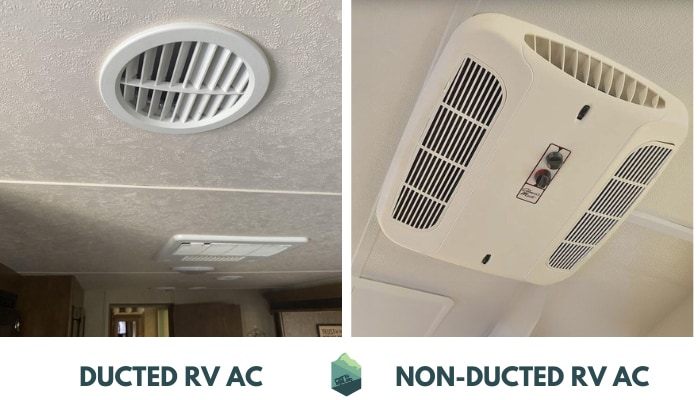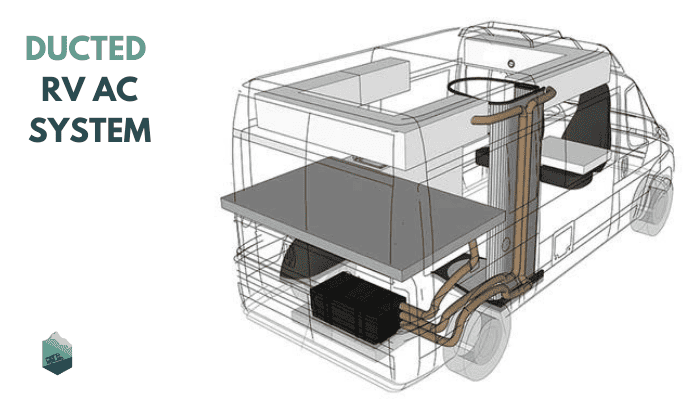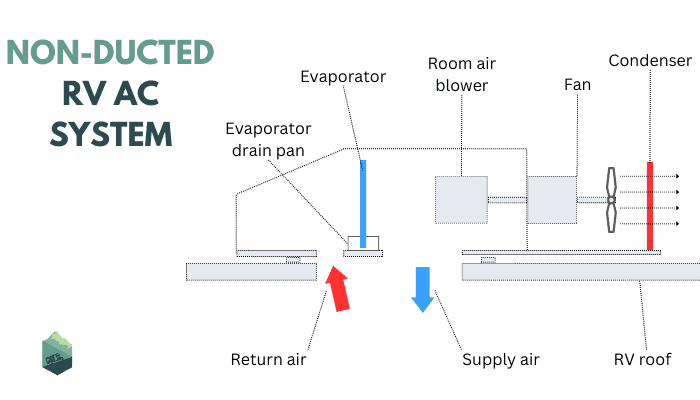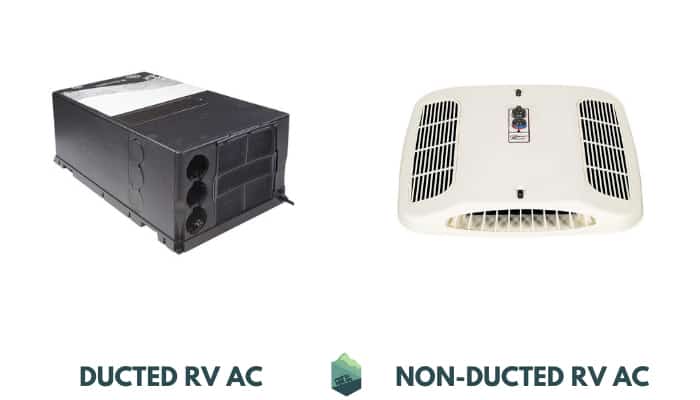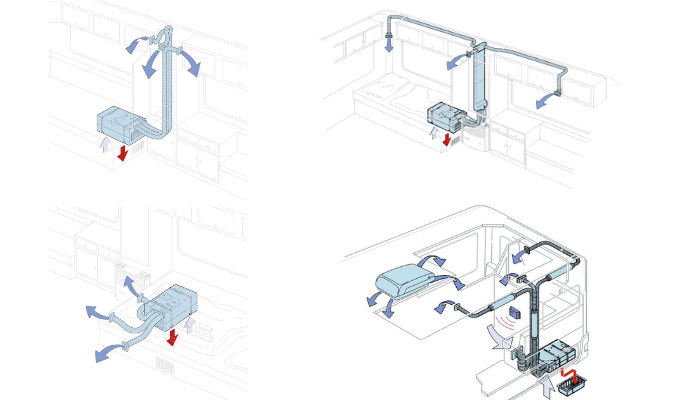Choosing between ducted vs non-ducted RV AC is hard since both are best to use. However, when you are a traveler and love RV camping a ducted air conditioner is the best choice for you.
A ducted AC unit is easier to use and comparatively affordable compared to a non-ducted RV air conditioner. It is specially made for RV camping as well.
So, to further understand the difference between a ductless air conditioner and ducted AC for RV, continue reading this article.
Page Contents
Ducted vs Non-Ducted AC Comparison
Air conditioning systems have been widely used by companies, homes, and even RVs. It blows air with fan speeds. This becomes one of the necessities of those people living in humid countries as well.
The two most known types of air conditioners are ducted AC and a non-ducted system.
Before we can further differentiate the ducted air conditioner and the non-ducted air conditioner, we should know what they are.
What is a Ducted Air Conditioner?
A ducted air conditioning system is a type of RV AC that is cost-efficient and convenient for RV owners and travelers. An RV ducted air conditioner installation is easier as well compared to the non-ducted AC.
A ducted system, also known as a central aircon, is made to cool air in the entire space. It has a central unit where the airflow comes from and is distributed by multiple ducts in different RV areas. These ducts can be placed either in the RV’s ceiling, outside, or under the floor if you’d like.
What is a Non-ducted Air Conditioner?
A non-duct air conditioner, otherwise known as ductless AC, is a replacement for the traditional AC unit. This device has a box, it absorbs the heat inside the room and transfers it to the unit outside.
A ductless RV air conditioner is affordable and simple to use.
Differences Between RV AC Ducted vs Non-Ducted
1. Size
The size of RV air conditioners depends on how big your camper is.
- A ducted system like Atwood AC units uses either 13.5k or 15k BTU.
- Non-ducted AC uses a 5k RV air conditioner most of the time.
Larger units typically use a 15,000 BTU AC unit to keep the airflow cold for the whole space.
2. Installations
Another factor that influences your choice is the installation of the air conditioning system.
Ductless AC
Amongst ducted and non-ducted AC units, a non-ducted air conditioning system is the easiest to install. It will take a little time and money. You don’t have to match it to any duct system since it can work alone.
- All you need to do is install the mounting bracket by drilling holes in the walls.
- Then, install the evaporator coils. For the line set, you must create a hole in the wall until the line set fits.
- Next, install the condenser coils outside and cover the line set to protect it.
There, you’re all set. For clearer instructions on how to install a non-ducted AC unit, press here.
Ducted AC
Installing a ducted RV air conditioner is more expensive since you have to check on your campers’ ceiling strength.
- First, you must be with someone who knows how to duct. After that, cover your furniture to free it from dust.
- Then, you must know where to locate the RV AC with the remote control and where to place its ducts.
The manual will coach you on how to connect its ducts and all the wiring safely. But, for your convenience, having an expert will help you with it. For more info, this will guide you.
3. Air Distribution
The most important factor most RV owners look for in an RV is how it distributes air. Well, let’s see which is much better between RV AC ducted and non-ducted units.
- RV AC ducting system has the capability of giving an even air distribution. It has one central unit which cools the warm air. The cold air is then distributed to a chain of ducts located in different areas in the RV. This way, RV’s temperature will be maintained, and there’s better airflow.
- A non-ducted ac, on the other hand, is only centralized in one area. Hence, there is uneven air distribution. Especially if your camper is large, it will be harder for the AC unit to cool the entire space.
4. Efficiency
A ducted AC unit is more favorable than a ductless AC unit in terms of efficiency. The ducted design generates less noise compared to the latter. It can control not only the RV’s temperature but even the humidity level.
5. Maintenance
You should not wait for your air conditioner unit to not work properly before looking after it. Preventing it from getting broken and maintaining its functions very well is your major priority.
Cleaning at least once every six months is enough to maintain ducted AC units. But if you have been staying outside for a very long time, make sure that you regularly clean the unit to avoid typical RV ducted ac problems such as leaking and not blowing out air.
A ductless system needs monthly cleaning to prevent them from accumulating too much dust and debris. Doing so will help the AC unit distribute air flow faster in a recreational vehicle.
6. Cost
Non-ducted RV AC can cost you somewhere from $700 to over $1100. Meanwhile, ducted units can cost over $1000 to more than $1400, depending on the brands and product features.
For instance, the Coleman RV air conditioner costs around $840, allowing duct and ductless installation. Notably, the installation fee will add much to the total expense, as with accessories, expect to pay $200 – over $600.
7. Pros and Cons
Knowing the advantages and disadvantages of using one of the two AC units will help you more in deciding what type to buy and choose for your RV.
1. Ducted AC unit
Pros
- A ducted RV AC unit can cool air in the entire RV with its ducts installed in different areas of the RV.
- It can maintain the temperature well in the camper.
- Ducted air conditioners operate quietly.
- Installing one system for your RV is enough to cool air in an RV.
Cons
- Compared to a ductless system, RV ducted AC is more
- Installing it is quite expensive. Having too many ducts to install equates to more expense.
2. Non-ducted AC unit
Pros
- For persons with an allergy to dust, using a ductless system is best as it keeps air fresh and there’s less dust.
- Heep the entire room in the cold air
- Installing this is less expensive and energy efficient as well.
Cons
- Cannot match just any design, thus requiring replacement occasionally
- A ductless system is capable of collecting dust, its maintenance cost is higher.
When Should I Choose a Non-ducted or Ducted AC Unit?
There is no one size fits all AC unit. The choice between models and a non-duct air conditioner depends on your preference.
In choosing a ducted RV AC unit, you must consider the following:
- For an RV with existing duct pipes, experts recommend choosing a ducted cooling system.
- If the location has higher humidity and hot air, a ducted AC unit is best at controlling it.
- A ducted AC system is the best choice in choosing the more affordable one.
In choosing a non-ducted system, the following are what you should consider:
- If you are allergic to dust, using a non-ducted air conditioner is the best option since it collects ducts and grimes.
- If you have limited space to place a ducted AC system, this is another option you can take.
- A non-ducted AC is enough for a small RV to keep its cold temperature.
Conclusion
RV air conditioning is an essential part of an RV. Especially when camping in a humid country, having an air conditioner is crucial. The question is, should you choose ducted vs non-ducted RV ac?
Well, now that you know each type’s benefits, pros, and cons, choose one! See what you need the most and what your RV needs. Houghton offers both types, and you just need to buy and install them. Then, you are good to go.

My career journey has been marked by a variety of roles. I served as a Personal Trainer for Children, Fitness Instructor, and Home-Based Consultant in Detroit Wayne Integrated Health Network.
More than ten years of traveling in my caravan have lent me a deep appreciation of freedom. Without the shackles of being tied down to one place, I get to explore many parts of the world and relish the exhilaration that comes with discovering new things. Throughout my journey, I have been a member of FMCA (Family Motor Coach Association) since 2020. Thus, living on the road has never become boring for me.
As someone with a burning passion for traveling, I want to inspire others to adopt a nomad lifestyle to appreciate the beauty of the world. This, of course, requires a functioning vehicle that can always make you feel at home, even when you’re far away from modern life.
Therefore, I seek to put my experience to good use—helping you with your adventure on the road. As a result, I launched and managed the Outdoorbits website, where I likely share my enthusiasm for outdoor activities and health-related insights.
